
I treat young people with infectious diseases, including HIV, and acute infectious diseases such as meningococcal disease (sepsis and meningitis). From my clinical work I know young people need to talk to their peers about HIV, but because of the stigma surrounding it they don't feel comfortable doing this in school or with their friends. In the summer the Children's HIV Association of the UK and Ireland, which I chair, ran a camp for about 80 children with HIV where they could talk in a secure environment without prejudice. One of my patients who had recently been told about his diagnosis and had not said much, really opened up, asking questions and being very vocal. It was so nice to see this assertive side of him.
Between my two roles, there is no such thing as a typical week. I start in the clinic at about 8.30am and the day finishes around 6pm, if I'm not on call. I mainly deal with HIV patients in an outpatient capacity, which just shows the fantastic medical advances in the past 20 years. Thanks to the anti-retro-viral medication, I need to see most patients only once every three months for a check-up. On Monday I may have as many as 10 patients, but I try not to have so many as I like to give the young people about half an hour each to talk about their concerns. There is a counsellor who joins us and can see the young people separately too. Despite the medical advances with this illness, there is a negative outlook deeply ingrained into the history of this disease and it's hard to reverse that thinking.
On Tuesday I might get a referral from another centre and so I'll organise for the young person to come and see me, then check with nurses to see if there are any specific social concerns that might not be on the young person's medical records. Sometimes, the patient will tell the doctor that they are taking the medication, but then admit to the nurse that they haven't, which can help us. It can be hard to get young people to take their medication – as teenagers they want their independence and to rebel a bit, and on the flip side of that they want to be like every other kid and not have to take the medication. Also they might not fully understand the prognosis – a few young people say, "I've stopped taking my medication because I'm going to die anyway," even though they can live healthy lives if they take the medication. My job is about ensuring that the family and the young person are aware of why they are at the clinic. This means explaining about blood, germs, and their diagnosis. I explain that HIV is a manageable condition and so long as they always take their medicines without fail they should have a full, normal, healthy life.
Last Friday, I went to the postnatal unit to make sure that a newborn baby was getting the appropriate testing and treatment. Then I arranged an appointment to see both the mother and baby in the clinic. After three months we are nearly always able to say that their baby definitely does not have HIV. This is a very tense time for the mothers. I see far fewer babies being born with HIV, whereas before about a third of babies would be infected if we didn't know the mother's status.
I love this job, and one of the things that is particularly nice about it is seeing the young people I treated years ago growing up and having children, and their children not being infected.
As told to Carlene Thomas Bailey
Paddy McMaster is consultant paediatrician at the University Hospital of North Staffordshire.

